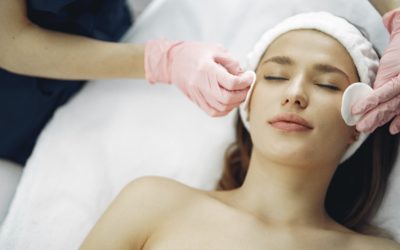Acne affects people of any age and gender. The vast majority of Americans have experienced acne at one time or another. Acne is an extremely common inflammatory skin condition that causes pimples, blackheads, whiteheads, and deeper cysts. Acne is caused by a number of different factors, including hormones, heredity, and stress. Acne usually affects the face, chest, neck, back, and shoulders.
Acne typically begins to make an appearance during puberty, when hormone levels rise, but it also occurs in adults. Some people can experience their first acne breakouts in their 20’s or even 30’s, and people can suffer from acne from acne well into their 50’s.
Acne occurs when the skin’s oil glands are stimulated to make excessive amounts of sebum. Sebum is the natural oils that moisturize the skin. Sebum is excreted through the hair follicles and comes out of the pores onto the skin. When the body creates an overabundance of sebum, the oil combines with the shedding dead skin cells and clumps together creating a plug in the pore. As the bacteria from the oil and dead skin cells grow, inflammation of the pore begins. These blockages are commonly referred to as whiteheads and blackheads. Blackheads, contrary to popular belief, are not caused by dirt. Rather, the top of the sebum trapped in the pore is touched by air, which causes the oil to oxidize and darken.
Many people can suffer from acne for decades. Often times women experience a fluctuation in hormones the week prior to their menstrual cycle, which can lead to acne breakouts. Certain medications, such as testosterone, can increase the chance of acne flare ups in both men and women.
Sun exposure can make acne worse. Sun exposure might initially improve the look of acne because it dries the skin. However, the body will start producing more oil to combat the skin’s dryness, which will make acne worse in the long run.
Other factors that increase the occurrence of acne are stress and diet. Certain foods have also been shown to cause skin sensitivities, like acne, in some people. Foods like dairy, sugars, gluten and some carbohydrates can cause an increase in acne to those with food sensitivities.
Acne can be very devastating psychologically for both teenagers and adults. People suffering with severe acne can form permanent scars on the face. People with acne can be traumatized by their condition. Many people become self-conscious about their appearance, making it hard for them to interact socially.
Unfortunately, there is no cure for acne. When it comes to treating acne, there is no one treatment that will work for everyone. It is important to consult with a doctor and/or a skin care professional, so that they can develop a treatment plan that works best for you. Most medical professionals agree that is best to start with treatment that has the least amount of side effects first. This includes using high-quality anti-acne cleansers and topical treatments on a regular basis. Regular deep cleaning treatments like HydraFacials help keep pores clear of debris that can clog them, which dramatically reduces the frequency and severity of breakouts. The key is consistency! Daily use of good skin care products and monthly facials maybe all that is needed to keep your acne under control.
When over-the-counter topical treatments and/or regular facials don’t work, it may be time to explore medications. Topical prescription medications include Retin-A, which increases skin cell turnover so the skin sheds dead cells more rapidly. Certain oral medications that block the production of some hormones may help improve hormonal acne. These include spironolactone, which is an androgen blocker that was originally developed to treat high blood pressure, and birth control pills. Antibiotics that slow the growth of bacteria in the skin might be helpful in reducing acne flare ups. All of these medicines have side effects and require a prescription. Accutane is extremely effective in treating severe cystic acne. However, Accutane can have some serious side effects and should only be taken under the close with close supervision of a doctor.
If you or someone you know has been suffering from acne, we can help. Schedule a free consultation with one of our skin care experts at The Skin Care Center at Gulf Coast Plastic Surgery.




